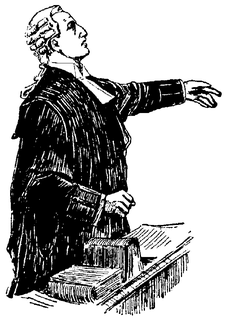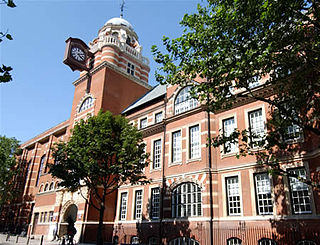External links
- Pupillage from the Singapore Board of Legal Education
- Barcode Chambers Student Guide: Don't let alien terms used at the Bar confuse or intimidate you!
- How to Get a Pupillage
A pupil master ('pupilmaster' or 'pupil-master') or, in the case of a female barrister, 'pupil mistress' etc., is the former name given to an experienced barrister who a pupil shadows during their pupillage. The terms have now been replaced by the term 'pupil supervisor'. Barristers are called to the Bar via one of the four Inns of Court upon successful completion of the BPTC and having undertaken a required number of "qualifying sessions" in their chosen Inn of Court. In most cases, the newly called barrister is then required to undertake training for a period of at least a year before being able to start their own private practice.
The training period, known as pupillage, is usually split into two periods of six months known as "sixes". The first "six" is a non-practising six, during which the pupil will shadow their pupil master; the second is usually a practising "six", when the pupil, with their pupil master's permission, can undertake the supply of legal services and exercise rights of audience in court. Occasionally, a pupil barrister may undertake a third "six", extending the training period a further six months. At the end of pupillage, to continue practising the law, a barrister may attempt to become a tenant in a set of barristers' chambers or find a position as an employed barrister.

A barrister is a type of lawyer in common law jurisdictions. Barristers mostly specialise in courtroom advocacy and litigation. Their tasks include taking cases in superior courts and tribunals, drafting legal pleadings, researching the philosophy, hypothesis and history of law, and giving expert legal opinions.

An advocate is a professional in the field of law. Different countries' legal systems use the term with somewhat differing meanings. The broad equivalent in many English law–based jurisdictions could be a barrister or a solicitor. However, in Scottish, Manx Law, South African, Italian, French, Spanish, Portuguese, Scandinavian, Polish, Israeli, South Asian and South American jurisdictions, "Advocate" indicates a lawyer of superior classification.
A solicitor is a legal practitioner who traditionally deals with most of the legal matters in some jurisdictions. A person must have legally-defined qualifications, which vary from one jurisdiction to another, to be described as a solicitor and enabled to practise there as such. For example, in England and Wales a solicitor is admitted to practise under the provisions of the Solicitors Act 1974. With some exceptions, practising solicitors must possess a practising certificate. There are many more solicitors than barristers in England; they undertake the general aspects of giving legal advice and conducting legal proceedings.
A bar association is a professional association of lawyers as generally organized in countries following the Anglo-American types of jurisprudence. The word bar is derived from the old English/European custom of using a physical railing to separate the area in which court business is done from the viewing area for the general public.

Legal education is the education of individuals in the principles, practices, and theory of law. It may be undertaken for several reasons, including to provide the knowledge and skills necessary for admission to legal practice in a particular jurisdiction, to provide a greater breadth of knowledge to those working in other professions such as politics or business, to provide current lawyers with advanced training or greater specialisation, or to update lawyers on recent developments in the law.
The call to the bar is a legal term of art in most common law jurisdictions where persons must be qualified to be allowed to argue in court on behalf of another party and are then said to have been "called to the bar" or to have received "call to the bar." "The bar" is now used as a collective noun for barristers, but literally referred to the wooden barrier in old courtrooms, which separated the often crowded public area at the rear from the space near the judges reserved for those having business with the Court. Barristers would sit or stand immediately behind it, facing the judge, and could use it as a table for their briefs.

The Inns of Court in London are the professional associations for barristers in England and Wales. There are four Inns of Court – Gray's Inn, Lincoln's Inn, Inner Temple and Middle Temple.
Bachelor of Laws is an undergraduate law degree in the United Kingdom and most common law jurisdictions. Bachelor of Laws is also the name of the law degree awarded by universities in the People's Republic of China, Hong Kong S.A.R., Macau S.A.R., India, Pakistan, Kenya, Ghana, Nigeria, South Africa, Botswana, Israel, Brazil, Tanzania, Zambia, and many other jurisdictions.
A bar examination is an examination administered by the bar association of a jurisdiction that a lawyer must pass in order to be admitted to the bar of that jurisdiction.
A pupillage, in England and Wales, Northern Ireland, Kenya, Malaysia, Pakistan and Hong Kong, is the final, vocational stage of training for those wishing to become practising barristers. Pupillage is similar to an apprenticeship, during which bar graduates build on what they have learnt during the BPTC or equivalent by combining it with practical work experience in a set of barristers' chambers or pupillage training organisation.
Devilling is the period of training, pupillage or junior work undertaken by a person wishing to become an advocate in one of the legal systems of the United Kingdom or Ireland.

Barristers in England and Wales are one of the two main categories of lawyer in England and Wales, the other being solicitors. Barristers have traditionally had the role of handling cases for representation in court, both defence and prosecution.
Legal education in the United Kingdom is divided between the common law system of England and Wales and Northern Ireland, and that of Scotland, which uses a hybrid of common law and civil law.
An admission to practice law is acquired when a lawyer receives a license to practice law. In jurisdictions with two types of lawyer, as with barristers and solicitors, barristers must gain admission to the bar whereas for solicitors there are distinct practising certificates.
A training contract is a compulsory period of practical training in a law firm for law graduates before they can qualify as a solicitor in the United Kingdom (UK), the Republic of Ireland, Australia or Hong Kong, or as an advocate and solicitor in Singapore. During the training period, the participant is known as a trainee solicitor or trainee lawyer.
The Bar of Northern Ireland is the association of barristers for Northern Ireland, with over 600 members. It is based in the Bar Library, part of the Royal Courts of Justice in Belfast, together with the Bar Council of Northern Ireland and the Executive Council. The Executive Council has taken on many of the functions formerly exercised by the Benchers of the Inn of Court of Northern Ireland, which was established at a meeting of the Bench and Bar held on 11 January 1926.

The Bar of Ireland is the regulatory and representative body for barristers practising law in Ireland, active since 1897. The General Council of the Bar of Ireland is composed of twenty-five members: twenty who are elected, four co-opted, and the Attorney-General, who holds office ex officio. Every year ten members are elected for two-year terms, five by senior counsel and five by junior counsel.

The Bar Professional Training Course or BPTC is a postgraduate course which allows law graduates to be named and practise as barristers in England and Wales. The eight institutes that run the BPTC along with the four prestigious Inns of Court are often collectively referred to as Bar School. Until September 2010, it was known as the Bar Vocational Course, or BVC. September 2020, the BPTC will be replaced by a number of courses with each offering institute having deciding on its own nomenclature for the firm.
Edmonds v Lawson [2000] EWCA Civ 69 is a UK labour law case regarding the National Minimum Wage Act 1998 and who is/is not included; it also considered whether a pupil barrister provides consideration to his/her master and/or chambers and whether that relationship demonstrated adequate intention. It held that pupil barristers are not included as either "apprentices" or "workers" for the purposes of the Act but do provide adequate consideration and intention to found a contract with their chambers.
Legal professions in England and Wales are divided between two distinct branches under the legal system, those of solicitors and barristers. Other legal professions in England and Wales include acting as a judge, as the Attorney-General, as a Solicitor-General, or as the Director of Public Prosecutions.